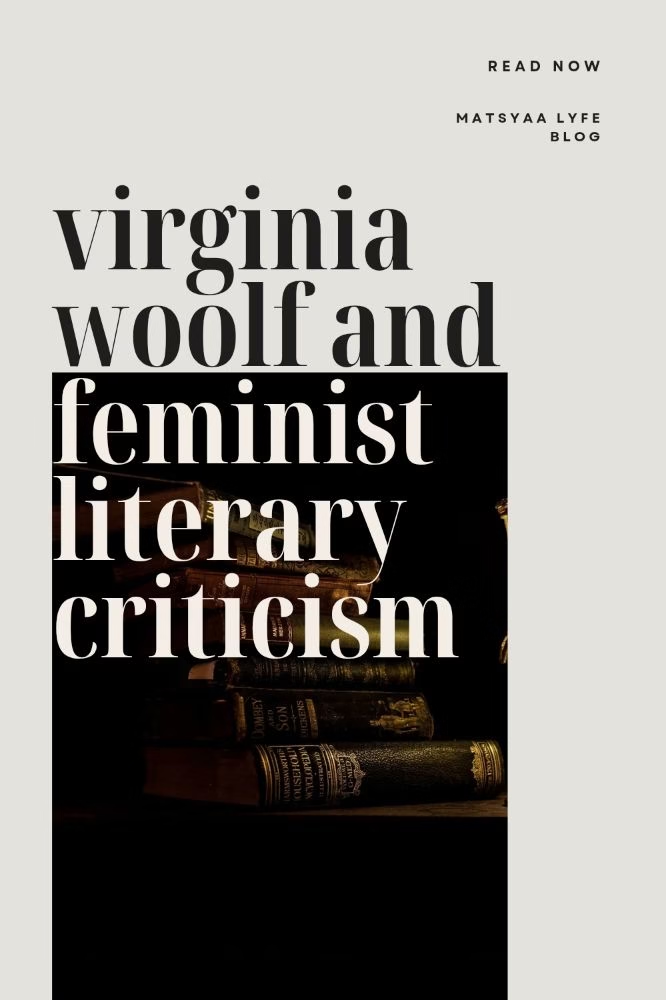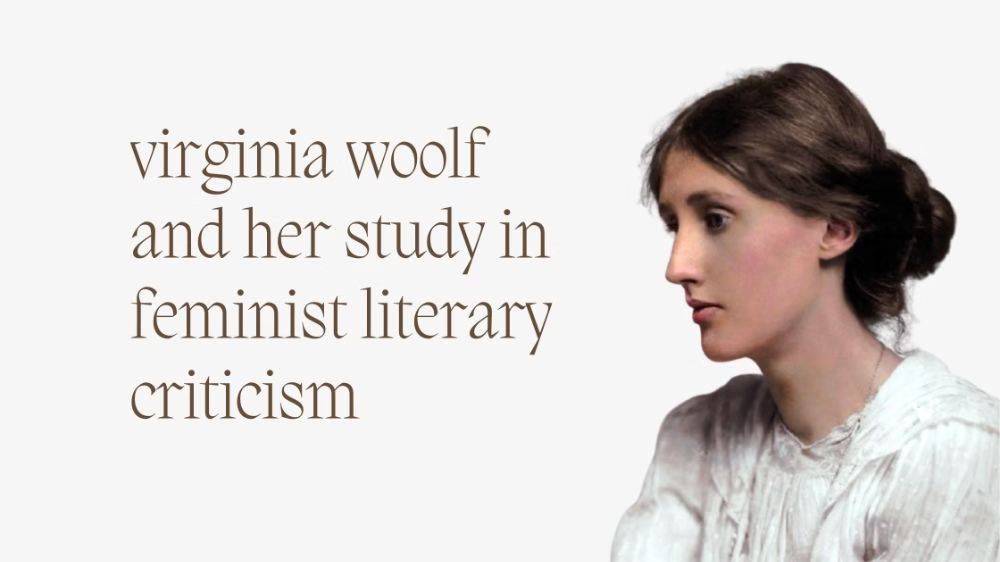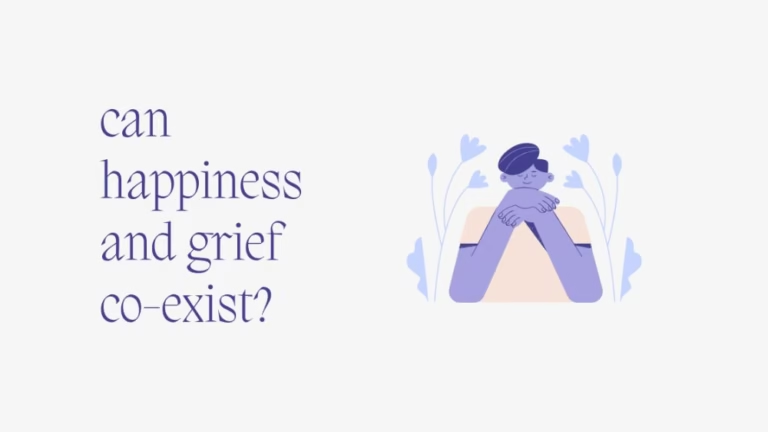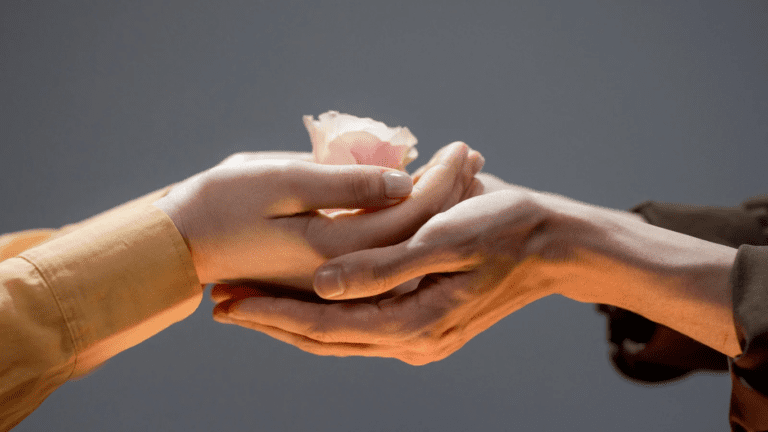The Remarkable Life of Virginia Woolf and Feminist Literary Criticism
I’m fascinated by the life of Virginia Woolf. Her thinking and philosophy about the feminist literary criticism is something to surely take inspiration from.
Such work, such philosophies, and…yeah, such a tragic end.
Virginia Woolf was born in 1882 to Leslie Stephen and Julia Duckworth. Her father was elected the President of The London Library in 1892.
Her work was seminal in the field of feminist literature criticism, her life was spent philosophizing over feminist writings, the restraints on women imposed by a predominantly male society, she was one of the leading female figures of modernist fiction, her most popular work being A Room of One’s Own where she uses a variety of metaphors to focus on how women are to write their own story and bring in a particularly feminine point of view in the world’s written works.

Virginia Woolf remained under a lot of scrutiny even by feminist authors because of her strong views on ideas such as the philosophical definition of what reality is, patriotism, feminine and masculine ideals and a kind of distinct femininity in literature. I love her!
We’re going to look at the life of Virginia Woolf, along with some ideas of her feminist literary criticism down below.
Let’s begin by talking about feminist criticism as it came down the centuries and what it was in the context of the twentieth century, the modernist era that Woolf was writing in.
Table of Contents
Feminist Literary Criticism
The beginnings of feminist literary criticism go back to ancient Greece. Think Sappho (who might be the world’s first feminist), Aristophanes’ Lysistrata (we studied that in first semester and…yeah…interesting, definitely), think Aristotle’s views of the distinct male and female ideas, everything being demarcated into two strict categories. Wife of Bath, created by Chaucer, bold character.
More recent women literary figures would be Aphra Behn, the first woman to earn a living by writing in her time among an audience that as so…arrogantly aware of their “superiority” over her. Jane Austen, George Elliot, who had to write under a name that didn’t give away her gender, Elizabeth Barrett Browning (I’m considering doing a post on her poem How Do I Love Thee?). Emily Dickinson, Sylvia Plath.
Think of all the female literary figures in history and just imagine how much they must’ve suffered to even be allowed to have something that is almost second nature to us now: education, the ability and permission to advance our thoughts freely, to speak up our minds, to not be subjugated under society’s huge gaze and constraints.
I feel a little bad sometimes because there’s still a lot of sexism (in addition to racism, homophobia, transphobia) going on around the world, but just think about how far we’ve come, and how…we’re at a considerably better place than…all these women were at.
History has to be rewritten to give space to all these women whose achievements were buried by the prevailing ideology.
Think: What were women shown as in literature that’s come down all these centuries? Angels, goddesses, virgins or whores, nothing in between, as obedient wives and mother figures or lecherous traitors. Penelope is good. Clytemnestra is a witch. Medusa is bad. Macbeth was just corrupted by Lady Macbeth and the witches. It was Helen’s fault. Histories gives us countless examples like this.
Aristotle’s ideologies advocated that someone is either man or woman, either master or slave, always has one definition that cannot be messed around with, boundaries that cannot be subverted.
Feminism in this regard aims to just blur those boundaries and say how there does lie common ground, how one doesn’t always has to be either one but can exist in shades between the two. There is space for androgyny here. More on that soon.
The Life of Virginia Woolf
Virginia Woolf has raised some pretty amazing questions about women’s literature and its perception on the social and economic front. Her pioneering work is, of course, A Room of One’s Own which, summed up, is, a woman needs financial freedom and a room of her own, that physical and psychological space, if she wants to write fiction.
If I told you that language has gender, would you believe me? No, right? Obviously, can you read a small snippet of something, know nothing about the author beforehand, and accurately say whether they are male or female? Do you possess that kind of intricacies in your perceptions yet? Congrats if you do. But literature, I would’ve said anytime, has no gender. Yet Virginia Woolf ends up classifying literature in male and female perspectives in her philosophies and teachings.
Let’s Talk About Gender
Virginia Woolf says in A Room of One’s Own how male language is categorized by that self-confident, almost arrogant, freedom of speech and mind, knowing that no one’s probably going to judge them too harshly or too ad-hominem-ly (is that a concept?) for whatever they write.
That being said, according to Woolf, a man’s writing seemed straightforward, no fear, no hesitancy on what is being implied or if it could have unexpected consequences. There is a kind of liberty in person. A confidence in “himself.” Something strictly male, so out of reach of a woman.
And a woman trying to imitate it doesn’t make a big impact.
Now, what exactly do I think Virginia meant when she said this? She wasn’t being sexist, she wasn’t backing up the male values that said that a women trying to write like a man would fail. The question is, do we want to write like men? Is writing like a man the standard? Obviously, not.
Why do women try to imitate men in writing? Where did that come from? Men were the ones predominantly writing and women felt the need that if they wanted their work to be recognized then they had to act like the one who’s work was recognized and that was a male, because obviously, females weren’t allowed to write anything at that time.
Read: Analysis of The Yellow Wallpaper by Charlotte Perkins Gilman.
Feminist Touch in Literature
This leads to Woolf calling for a complete revolution in the literary tradition, writing without boundaries, without the question of sex or gender or sexuality hanging on their heads. That being said, there do seem to be ideas of writings about epics, and heroism, and war and nationality being conventionally male (again, socially constructed; everything is socially constructed, otherwise, we were all bacterias in the beginning). Lyric, on the other hand, along with emotions and passivity, seem to be elements that are considered feminine because of their flow and their…emotivity.
Virginia Woolf asks women to write like women, but—without being conscious of the fact that they’re women, with that sex itself being unaware. That’s what she praised in the work of Mary Carmichael, a fictitious novelist in A Room of One’s Own; how she mastered that lesson, she “wrote as a woman, but as a woman who has forgotten that she is a woman, so that her pages were full of that curious sexual quality which comes only when sex is unconscious of itself.”
S. T. Coleridge said, “A great mind must be androgynous.”
Oh jeez, okay, the discussion on gender and sexuality ended up being longer than I’d thought and I fear it’s going to get longer, so, before that happens, let’s talk a little bit about the early life of Virginia Woolf.
When she was young, she had access to her father’s huge library. She received her education there, studied philosophers, English classics and Victorian literature, and later attended King’s College London.
Virginia Woolf was a part of the Bloomsbury group, (“no, not the publishing house,” my professor said right after telling us about it.) Virginia and her sister, Vanessa, used to move in a fashionable area in London, where they’d settled along with their siblings (six of them in all), after the death of their parents. The economist John Maynard Keynes was a part of this group. It was a pretty big deal.
She and her husband Leonard Woolf established the printing press, Hogarth Press, where her own work, along with other modernist writers like T. S. Elliot’s, E. M. Foster’s work was published.
This group gave Virginia the in into the circles of many influential thinkers, among whom was the notable realist-analytical philosopher G. E. Moore, who seemed to have an impact on Virginia’s own philosophies.
However, despite her literary genius and her thirst of knowledge, obviously there were so many limitations set on Virginia Woolf that she suffered from anxiety and nervous breakdowns,, conscious of all the forces thwarting her aspirations in a milieu dominated by such rigid male values. This must’ve inspired her to write her character Judith, in A Room of One’s Own, Judith who’s an imaginative sister of William Shakespeare and as talented as him, but suffers from countless roadblocks that her brother doesn’t have to face.
The tragic fate of Judith is just like what happened to Virginia herself. Such genius, such amazing work, such amazing thoughts, and such burden of trying to prove it.
Virginia Woolf Quotations
Woolf writes in Moments of Being: Unpublished Autobiographical Writings, her autobiographical work, asks, “[why] were the most gifted of people also the most barren? … why was it all so negative?“
Since this isn’t a post about the era of Romanticisim and Enlightenment ideals that shaped the society around that time, we will keep the matter of our discussion on Virginia Woolf, her life, her feminist literary criticism and her shaping of literature in the twentieth century. If we were to begin talking about Romanticism ideals and the Enlightenment Era, we’d be making a post of thousands of words. I’m up for that, are you?
Feminist literary criticism sees a rejection of bourgeois rules and what was the Enlightenment ideal of man being at its center, a free rational agent who had knowledge that could enable him to subjugate the world and all its natural elements.
In The Common Reader: First and Second Series, Woolf says, “let us say what comes into our heads, repeat ourselves, contradict ourselves, fling out the wildest nonsense…without caring what the world thinks or says.”
Did Virginia want them, the female literary figures, to break themselves away from the shackles of the world’s obsession with reason and logic and “common sense”—instead opting to shape literature in their own way? Did she want the female literary figures to use whatever feelings and emotions they deemed fit, whatever was required to present the reality they knew, in front of their audience?
I think her life remains remarkable because of the strong view-points she’s held through all of her career. The way she’s met masculine ideologies head on without fear of what this constant struggle is doing to her own mentality. Why was her mind barren? Because she had recognized the flaw in the matrix and had decided to fight it, and fighting it would entail struggling to make herself heard and understood and read all her life, know her ideas that catered to or could please only half of the population, her unflinching philosophy and definitions.
In A Writer’s Diary: Being Extracts From the Diary of Virginia Woolf, she writes as in an entry of 1993, “I will go on adventuring, opening my mind and my eyes, refusing to be stamped and stereotyped. The thing is to free one’s self: to let it find its dimensions, not be impeded.”
In fact, her definition of the word feminism, in Three Guineas, was “one who champions the rights of women,” and, since the right was to earn a living and it had already been won—according to her—in her surroundings, she advocated how there was no need for the word to have any meaning anymore and was hence a dead word. That did not sit well with many feminist critics around the world who were still struggling to stand their ground in front of oppressive forces.
But Virginia Woolf was living in rapidly changing times. She had a strong will. Reading her would make our own writing endeavors eventful as we’d come to see just how much women in history have suffered, and why it’s necessary to bring that truth out in the open—through our writing.
“Women have burnt like beacons in all the works of all the poets.”
-A Room of One’s Own, Virginia Woolf
In 1941, Virginia Woolf walked into a river with her pockets full of stones, probably not able to keep the barrenness out of her mind anymore. She drowned, thus meeting the same fate of Judith, who committed suicide in the story of A Room of One’s Own, because there was just not any place for her in the theater, as the men told her; her father’s rage, the theater-men’s exploitation of a woman. It’s more of a frustration and less of a fragility. How much is one supposed to fight after all?
Both Virginia and Judith might’ve been female geniuses and able to create really good literature, but their defeat in front of the system and the ideals that have come down through centuries lead them to the same fate.
Before I end this article, I told you we’d talk about androgyny and what I believe it could do good for us. Here’s that little piece of discussion.
There’s the feminist concept of the body directing its thoughts, depending on where I’m born, in what body. If I’m born a woman, I’d think in a way that’s good for me as a woman. If I’m born a man, I’d think in a way that’s good for me, as a man. The same things with the country I live in, the culture I was raised in, the lessons my parents taught me. Everything comes down to the body and the conditioning of the body. There’s actually no reason to fight. I’m doing what’s best for me and I expect you to do what’s best for you.
If everyone accepted that this actually determines how we think and what we believe to be true and how we react to outside circumstances, there would be far lesser misunderstanding and far lesser hatred.
Takeaways? The greatest mind is androgynous. Virginia Woolf gave some pretty good feminist ideas during her remarkable life. Feminist literary criticism is an amazing area for study.






